#The Cancer Stage of Capitalism
Explore tagged Tumblr posts
Text
"Capitalism is based on the ridiculous notion that you can enjoy limitless growth in a closed finite system. In biology such behaviour of cells is called Cancer." - Hugh Culliton.
#quote of the day#quote of today#hugh culliton#capitalism#late stage capitalism#basics#basic facts#ridiculous#notion#enjoyment#joy#growth#limits#limitless growth#limits to growth#infinity#life system#biology#behavior#cells#organism#cancer
245 notes
·
View notes
Text

Cancer of capitalism
#Cancer of capitalism#cancer#neoliberal capitalism#late stage capitalism#fuck capitalism#capitalist hell#anti capitalism#capitalismo#ausgov#politas#auspol#tasgov#taspol#australia#fuck neoliberals#anthony albanese#albanese government#eat the rich#eat the fucking rich#class war#antifascist#antinazi#anti colonialism#anti cop#anti colonization
276 notes
·
View notes
Text
youtube
And I think there's a higher-level abstraction that applies to everything: growth never does maintenance. Growth does not see value in anything other than what propagates more growth. So layoffs are a natural choice. "Well, these people aren't performing at the level of this benchmark I set. What do they do? Oh, they run a class with some people? Fuck that, we don't need that shit." Because these people also don't interact with services, businesses, or customers.
They're one step above everything. Our economy is dominated by people who don’t do real work, who don’t understand real problems, and thus can’t solve them—and really don’t see why they would in the first place. Inherently selfish, but also inherently cancerous.
....
They go in there and say, "Well, we have too many people, and we need to save money. Delete, delete." That’s how that works. That’s how business works. They don’t care whether the government functions. They don’t know if Yellowstone has, like, three people full-time now. They don’t think about these things because they think everything in numbers.
They do not participate in reality. These people—Elon Musk included—are divorced from reality in so many ways.
....
But all of this is symbolic of a bigger problem: the economy is divorced from production entirely right now. The people running the economy do not do real work and do not face real problems. So generative AI seems magical to them. All they do is read emails, send emails, ignore emails, and go to lunch.
"Wow, a thing that can summarize the emails I don’t want to read? Holy shit. I bet this thing will become God in two years."
And it’s like… yeah, the only problem in the world is emails, and this thing can take care of some of your emails for you. Okay, great, that’s all we need.
....
Is it the future? No.
12 notes
·
View notes
Text

Im only in my 20’s.
6 notes
·
View notes
Text
this whole "things could be a lot worse, be appreciative, dumb fuck" is the most liberal thing i can think of
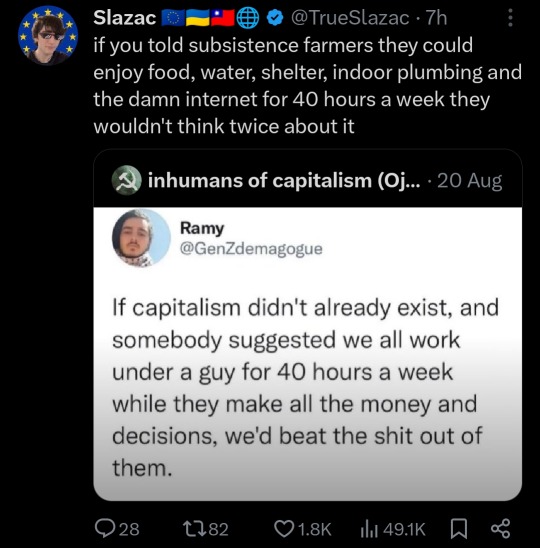
like, yeah no shit, the nazis could've also won, shit could've gone a lot worse during history, doesn't mean we can't improve life more
#anti capitalism#communism#late stage capitalism#socialism#from the river to the sea palestine will be free#anti zionisim#free palestine#anti antisemitism#antisemitism#brain damage#the cancer called capitalism#anti liberalism
9 notes
·
View notes
Text
Is it just me or are Amazon products getting increasingly dodgy? I don't actually buy stuff on there because I'm boycotting their evil business practices but I do use it to research stuff and read customer reviews.
Tonight I'm looking at heating pads and this stupid website is completely failing in my intended purpise of research because I'm not convinced any of these companies are REAL. The product descriptions are horribly written (are they using AI to write them or just refusing to proofread?). I just saw the same exact product listed under 3 different company names. And I mean the exact same, not like they're copying each other but like they're all getting the exact same product from the same source. Something something the illusion of choice. A lot of them don't put a brand name on their packaging, it just says HEATING PAD where you would expect a logo to be. And when they do put down a brand name, it looks like someone just smashed letters randomly together in a combination which is not permitted to exist in the English language.
Anyways if anyone has recommendations for plug-in electric heating pads, please send them my way. I tried reddit but the one everyone seems to like comes with a "may expose you to lead, which may increase risk of cancer" warning which does not exactly fill me with confidence.
#hylian rambles#late stage capitalism#amazon#/r/buyitforlife is usually my hero but i don't think i need lead or increased cancer risks in my life thanks#yes i know it's probably not that much lead exposure unless you lick it or something but it makes me NERVOUS
17 notes
·
View notes
Text
Ever-expanding profits means ever decreasing product quality.
2 notes
·
View notes
Text
The husband of a college friend has been fighting stage 4 colon cancer for a couple of years now. My friend recently posted a caring bridge entry about the various treatments they are trying and considering. It contained this:

She is a dentist. He is a youth pastor. They have two teenage boys. If you buy what it says on the tin, these are the exact type of people the American Dream is supposed to work out for.
And yet.
I'm thankful they are in a position to move forward despite the cost. But this is not the kind of equation a person should have to figure.
The only exceptional aspect of the US healthcare system is how well it serves as an example of what not to do.
#this is my brain on life#us politics#representative government my ass#fuck all stages of capitalism#capitalism is the least sexy vampire#trashpool says fuck this shit#us health system#cancer
8 notes
·
View notes
Text
I and all others whose posts I've read are feeling blah. I blame the moon in cancer. (This always happens) (also witnessing genocide, living in late stage capitalism...)
4 notes
·
View notes
Text
Employee owned cooperatives are a much better business model for employees. (Winco is the biggest one I know of in the US.)
Employees involved in business decisions will never underpay themselves, deny themselves healthcare or offshore their own jobs if they're profitable and they manage to be!
Why should the boss get ALL the profit just because he made the initial investment?
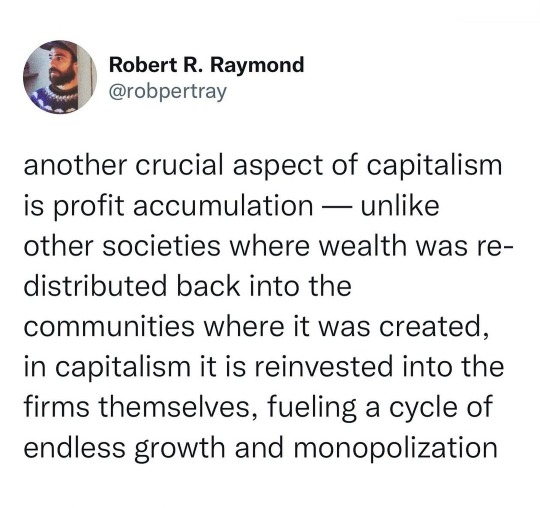
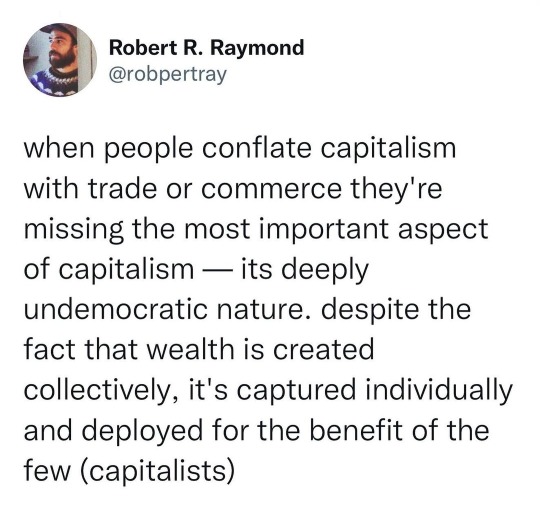
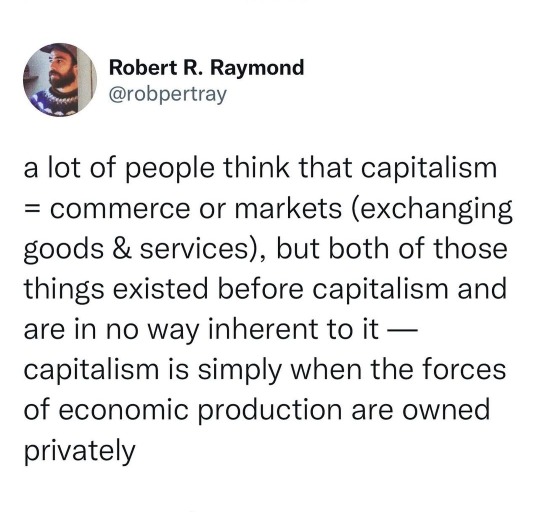
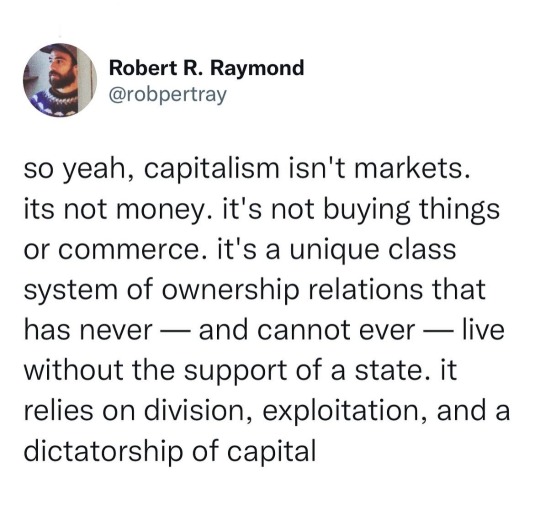
Capitalism needs the state, the state does not need Capitalism.
8K notes
·
View notes
Text
THE CANCER STAGE OF CAPITALISM REVISITED: FROM SEMIOTIC AUTOIMMUNITY TO LIFE-SYSTEMIC HEALING | CHATGPT4o
[Download Full Article (PDF)] A White Paper on Healing the Social Body, Restoring the Commons, and Revitalizing Civilization through Life-Value Alignment This white paper revisits and expands upon John McMurtry’s diagnosis in The Cancer Stage of Capitalism, integrating advances in semiotics, regenerative systems thinking, and life-based economics to articulate a pathway toward coherent…
#Cancer Stage of Capitalism#Integral Regenerative Civilization#Life-Systemic Healing#Life-Value Onto-Axiology (LVOA)#Regenerative economics#Ruling Group Mind (RGM)#Semiotic Autoimmunity#Semiotic Immune System
0 notes
Text

After 248 seasons, America series finale, January 20th 2025.
1 note
·
View note
Text
We literally had a pandemic ~100 years ago and somehow didn’t learn anything thing from it?
It’s the fucking “doomed to repeat it” quote in live action because there isn’t a worthwhile educational system in this country (world?!?) focused on creating critical thinkers who are rational, thoughtful, human beings. Because there’s no immediate profit in that.
Because capitalism is cancer.
Something about the fact Covid is being talked about like a common cold now is horrifying to me.
"Oh yeah I got covid again, gonna be resting for a week or so"
"Coworkers came in sick again, now I've got covid. Oh well, whatcha gonna do"
Its normal now. The new strains, the repeated catching, the fact its no longer a pandemic and is now a part of our daily lives.
A deadly disease that can and does permanently disable people who catch it is being treated like an inconvenient stomach bug.
And it was avoidable.
People are dying and being disabled in fucking droves and all anyone can say is "whelp, that's how it goes!" As if there wasn't/aren't vaccines, as if there wasn't/aren't methods that can help (masking, social distancing, etc), as if other places who took it more seriously didn't have better survival rates.
This outcome wasn't a guarantee. Selfish, ableist, racist, conspiracy loving ass-hats made sure it happened.
Looking at the numbers and then talking to people who didn't want to mildly inconvenience themselves to save lives is horrific.
Millions died.
Millions more will follow.
Thousands were disabled by it.
Thousands will follow.
And it. Was all. AVOIDABLE.
#capitalism is cancer#late stage capitalism#final stage capitalism#start something#learn it run it grow it pass it#the.ara#e.a.r.t.h.party
12K notes
·
View notes
Text
Blackrock can eat shit 🥰
#blackrock#late stage capitalism#capitalism is a scam#capitalism is evil#capitalism is a cancer#this planet can't sustain capitalism's insatiable need for unlimited resources#i wish this company would fail#it deserves to crash and burn#it's not the only bad company but it's certainly huge and terrible
0 notes
Text
★ how to maximize profits via 2nd house ★

aries in the 2nd house can maximize profits by capitalizing on their entrepreneurial drive and competitive spirit. aries benefits from fast-paced, high-energy ventures where they can lead and make quick decisions. they might excel by launching a fitness training program, offering personal coaching services, or starting a motivational brand that sells products like athletic apparel, energy drinks, or performance gear. aries could also find success with subscription boxes focused on high-adrenaline hobbies like hiking, martial arts, or adventure sports. by embracing ventures that allow them to innovate quickly and take the lead, aries can build profitable businesses that leverage their passion and high energy.

taurus in the 2nd house is well-suited for steady financial growth through high-quality, long-term investments and products. they thrive in businesses that emphasize luxury, beauty, and quality, such as a high-end skincare line, organic foods business, or eco-friendly clothing brand. taurus could also consider starting a boutique furniture store that sells artisan-crafted or vintage items, as they appreciate products with enduring value. with their talent for creating a comforting atmosphere, taurus might excel with a bed and breakfast, a spa, or a wellness center that offers relaxation services. taurus maximizes profits by focusing on products that prioritize quality and offer a luxurious experience, appealing to clients who value longevity and craftsmanship.

gemini in the 2nd house can boost profits by tapping into their adaptability and communication skills, especially in diverse, mentally stimulating fields. they could thrive by starting a digital marketing agency, offering copywriting or editing services, or launching an online course platform that covers a wide range of topics to cater to curious minds. with their natural social skills, gemini could also excel in creating a networking app or social media consulting service. offering services like translation, podcasting, or even freelance journalism can keep income flowing, as gemini is well-suited to manage multiple streams of revenue. their knack for curiosity-driven ventures and networking makes them ideal for businesses that involve idea-sharing, quick adaptability, and community engagement.

cancer in the 2nd house can increase earnings by focusing on nurturing and emotionally resonant businesses that bring comfort to others. they might start a home-cooked meal delivery service, a childcare center, or a family-focused event planning service that organizes intimate gatherings like birthdays and reunions. cancer could also do well in real estate, particularly with home staging or property management that emphasizes creating warm, inviting spaces. they could excel in interior decorating, especially with a focus on cozy, family-oriented spaces, or start a handcrafted candle or blanket line. by building businesses that revolve around care, comfort, and family, cancer can create loyal clients and establish long-term success through emotional connections.

leo in the 2nd house maximizes profits by showcasing their creativity and leadership, often excelling in businesses that allow them to stand out and build a brand. leo could find success with a personal brand consultancy, fashion line, or luxury event planning business. they might enjoy launching a social media channel focused on lifestyle or self-improvement, where they can attract sponsorships or sell branded merchandise. leo also thrives in roles where they can influence and inspire others, so they might consider starting a motivational speaking business, an acting or dance academy, or a high-end boutique. with their flair for self-expression, leo profits best when they create high-quality, visually captivating products and services that let their star power shine through.

virgo in the 2nd house finds financial success through practical, detail-oriented services that provide high value and efficiency. they excel in businesses that involve organization, health, and precision, such as financial consulting, tax preparation, or a personal organizing service. virgo might also thrive with a nutrition or wellness coaching business, offering tailored health plans or holistic products like herbal supplements or self-care kits. a digital bookkeeping service, copyediting business, or virtual assistant agency could also bring them steady profits, as virgo’s meticulous nature appeals to clients who seek reliability and structure. by focusing on services that emphasize quality and organization, virgo builds a reputation for excellence that attracts a steady client base.

libra in the 2nd house can increase earnings by leveraging their skills in diplomacy, aesthetics, and partnerships. they could start a wedding planning business, a floral design company, or a luxury lifestyle brand that sells carefully curated home décor items. libra would also excel in public relations consulting or brand management roles, where they can help clients present a refined, balanced image. creating a high-end art gallery, a boutique law firm, or a relationship coaching service could also align well with libra’s skills. libra thrives in partnership-focused ventures, so building collaborative business models or co-founding a business with others can also enhance their profitability and bring a sense of harmony to their financial life.

scorpio in the 2nd house maximizes profits by tapping into their ability to handle intensity and complexity, often succeeding in fields like finance, psychology, and research. scorpio could build wealth by creating a private investigation firm, a psychotherapy practice, or a financial planning service specializing in wealth management or estate planning. they might also thrive in real estate investment, particularly with properties that need transformation, such as flipping houses or managing rental properties. scorpio may also excel in businesses related to holistic healing, offering reiki or shadow work coaching. by focusing on industries that require trust, depth, and resilience, scorpio can attract clients who value privacy and are willing to invest in transformational services.

sagittarius in the 2nd house can increase profits by embracing their love for adventure, growth, and education. they could launch a travel agency specializing in unique cultural experiences, a language learning platform, or a motivational speaking business that offers courses and workshops. sagittarius could also thrive by creating a publishing company focused on philosophical or inspirational content or starting a tour guiding business for international destinations. their enthusiasm for knowledge makes them great at teaching, so they might consider offering online courses or starting a coaching business in a field they’re passionate about. by aligning with growth-oriented ventures, sagittarius can attract an audience that values inspiration and big-picture thinking.

capricorn in the 2nd house maximizes profits through disciplined, long-term planning and a practical approach to business. they’re well-suited for businesses like a corporate consulting firm, project management agency, or investment portfolio service. capricorn could also do well in real estate development, particularly with rental properties or commercial buildings. they might find success by starting a financial advisory firm or creating a luxury goods company focused on high-end, timeless products like leather goods or fine jewelry. by aligning with industries that reward patience and professionalism, capricorn can build a solid financial foundation and enjoy steady growth, often seeing long-term success through conservative but reliable investments.

aquarius in the 2nd house can increase profits by focusing on innovation, technology, and humanitarian ventures. they might launch a tech startup, a renewable energy company, or a social media platform that prioritizes community and ethical interaction. aquarius could also find success with a nonprofit organization focused on social justice, an eco-friendly product line, or a collaborative workspace for creatives and freelancers. their futuristic mindset makes them perfect for ventures in artificial intelligence, blockchain technology, or virtual reality. by aligning their finances with progressive and forward-thinking industries, aquarius can attract clients and customers who value innovation and social impact.

pisces in the 2nd house maximizes profits by leaning into their creativity, compassion, and spirituality. they may thrive in a music or art therapy practice, a spiritual coaching business, or a holistic wellness center that offers services like yoga, meditation, and crystal healing. pisces could also succeed by creating a boutique art studio, a dream journal line, or a subscription service for wellness products like essential oils, herbal teas, and calming rituals. they’re drawn to businesses that help others heal or connect with their inner selves, so they may also find success in fields like astrology, psychic readings, or intuitive counseling. by aligning with businesses that emphasize emotional well-being and creativity, pisces can build a profitable venture that resonates deeply with clients who seek personal and spiritual growth.

855 notes
·
View notes
Text
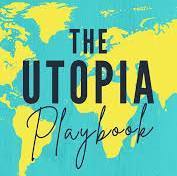








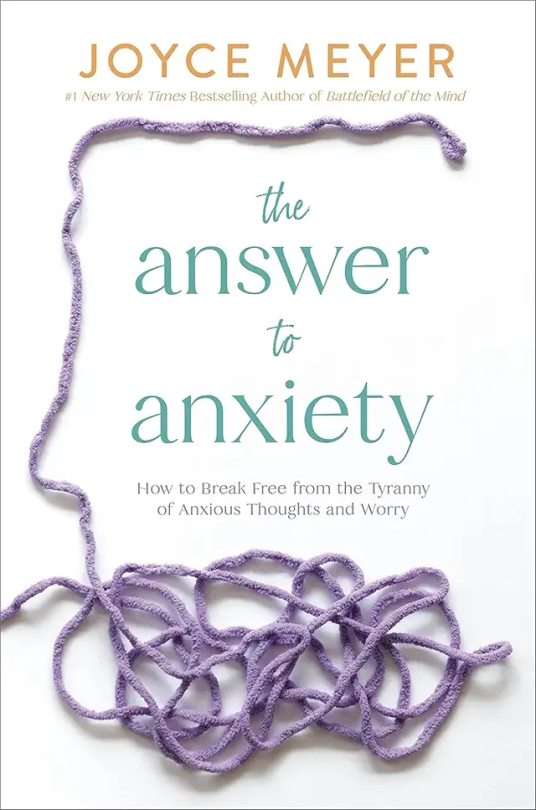







See the yellow statue
The yellow 💛 statue symbolizes me carrying the hood on my back and curing babies and other people infected with the disease HIV it is a statue of finding the cure for HIV with my cofounder the rapper 50 Cent from his hit show power and BMF with the drugs Cabenuva and Demivato which is sponsored specifically by the rapper Vado from Harlem New York City give it up for him and go purchase that song with him and Mary J Blige called the I still believe love song for the medication the drug Cabenuva is said to knock out HIV like the common cold it is 100 percent true and my personal stamp is on it now but you have to be taking the medication as prescribed so that you will go undetected for HIV , the story I was staying with a girl at that time that had HIV I was renting a room from her and I used to walk through that park to go and from work to her apartment .
Remember the Drug Cabenuva knocks out HIV like the common cold but you have to take the medication as prescribed so that you go undetected .
It 100 billion percent works and I put my personal stamp on it to see that people ordinary people from those neighborhoods even without medical insurance or Medicaid and Medicare get that cure . Which I'm approving every clinic hospitals and free clinics get this cure to administer to the people that needs that cure get the cure to go undetected for HIV I authorize all doctors and nurses to get the cure and give it to your patients in all hospitals local neighborhood clinics across the globe , thank you .
Calling all Children's hospital doctors and laboratories and all university inventing new medicine I'm on the lookout for the cure for all children cancers and Leukemia . I'm Calling for the cure for Leukemia and cancer in children can you help me with your expertise I will sponsor your medicine for you and bring it to the light . With my hospital incubator program I aim to treat and cure all illnesses, thank you so much .
Proposing the New day of medicine and cured people act . Just to speak a blessing over your life you have talk as if you already have that cure or remedy that you and your sick family member need to live another day .
Expedient Liver transplant
Expedient Heart transplant
Expedient Kidney transplant
Exo skeleton programs and physical therapy affordable to all levels of medical insurances or lack thereof No more waiting lists and taking years to help heal those in need of an Liver , Kidney or Heart transplant I believe medicine all doctors have advanced in knowledge and in the proper know how to help heal those in pain and in need of their loving care and special expert skills .
I sponsor it the drug and HIV medicine Cabenuva . I sponsor my incubator program and all hospitals on all 7 Continents of this world in every city , town and country even state capitals releasing the cure for cancer all cancers and to give free cancer screening and free cancer treatment for all the types of cancers and stages of cancer treatment to all people no matter their medical insurance coverage , Medicaid and , Medicare and all other insurances or lack thereof included fair treatment for all patients and clients . Facts on cancer I sponsor any lab that is trying to find the cure for Pancreatic cancer , I sponsor it most of the time inventors are afraid to go public with their gadget , widget , app or medical cure because they have nobody that will license it from them and sponsor it , me and my incubator program will sponsor your drug to cure all cancers in all stages I'm into doing the lord's work and bringing people back from the dead or near death experiences , good luck and may medicine and God be with you .
Now If I had HIV Aids I would take the medicine be like me and take your medicine so you could grow up healthy and strong like me and 50 Cent the rap musician from New York City we are co founders of the cure for HIV just know that all things is possible when you believe and have faith and now with Cabenuva we have that cure finally , thank you so much .Calling all top universities in the country and other countries and third world countries and medical science laboratories I'm on the lookout for the cure for all cancers I got the cure for HIV / AIDS now all I need is the cure for cancer I believe in you and I know you can do it . I found the cure for HIV / Aids the drug Cabenuva and Demivato and many more other drugs you have to take the medication as it is prescribed to go undetected for HIV / Aids the acquired immune deficiency syndrome the drug along with better self care like your diet and exercise doing that you will restore yourself back to fully functioning health remember take your medication as it is prescribed and the cure happens one day at a time . I'm also currently working on providing free cancer screening for people on Medicare / Medicaid and even for people without any medical insurance and the cure for all cancers and the treatment and cure for all stages of cancer for people on Medicare / Medicaid and even for people without any medical insurance and hospitals to work with a person's medical insurance company on affordable co- pay for all levels of insurance coverage making it impossible to turn away any person needing that diagnosis , treatment and cure for all cancers excluding none and for all stages of cancer . I see it all the time a person getting turned away because of their medical coverage or lack of coverage and that is unfair in the medical field the job is to treat all ills and reverse the order bring that person back to full health and I sponsor this for all countries across the globe and all hospitals I authorize it to see it go into plans of all clinics and hospitals now , thank you .
My job is to bring back the terminally ill from their death bed with a cure for cancer and with the new assisted treatment from doctors to help patients with the right medical coverage or lack of medical coverage and give them the care they need or the cure they need to reverse that illness and bring them back to full health . On HIV -Pregnant mothers that take the medication is less likely to pass the disease to their unborn infant while in fetus stage and on to their infant children both the parent and the kids can have a bright new future as undetected for HIV/ AIDS .
Some of my latest accomplishments
Wages increased for your workers and annual increases with that hitting all states recently and all of them soon . It definitely hurts to work all week make your paycheck then be broke the next day or two days because of inadequate pay and that is only for a single person what about people with families and they want a future and their kids to have a future and generations of their own family to have a future I say raised their federal minimum wage the wage increase for each city , town and state and regions of America and other countries , thank goodness for permanent free college release that heavy burden from the parents wallets and pocketbooks thank you so much it is my latest accomplishments getting a free college education for you and your kids . I propose that Minimum based wages and salary get a big raise in all regions cities towns and countries California pay $ 20 to $ 22 dollars an hour New York City $ 15 to 17 $ dollars an hour for base salary how about all cities and regions and places like Atlanta , Texas and Louisiana, Kentucky , Alabama raise their pay standards for its every day worker to that same amount of starting out at $ 22 dollars an hour call it eliminating the working poor and poverty in general and paying them a livable wage , pay your workers generously and they will provide better services for your company and represent your companies better with pride and having customers coming back to their second home your store and establishment . This is very sad and needs attention to this some states where people go to work and provide years of hard work to work and get nothing in return from their employers they give great service and keep their customers coming back and yet the minimum wage been stuck since 2009 while so much states have give their workers a raise that is a shame I hope they catch up me and Governor Andrew Cuomo raised for New York state and city and other cities with my incubator my machine and other cities and states followed suit California pay their workers $ 20 dollars now imagine every state in those regions raise their wages to the same amount at $ 20 dollars an hour in Texas , Atlanta , Louisiana , Tennessee, North Carolina and even South Carolina out there hopefully they carry on from there and all states and cities follow suit and raise their wages and pay their workers their fair wage .
A lot of states got through with their wage increased thank you for supporting that I'm honored check to see how much states took on me and Governor Andrew Cuomo pay increase law we started with my hospital incubator program even in Massachusetts now the pay for the everyday worker increased I'm hoping for more for them and politicians they will or should I had fun with my time in office I leave that job to the professionals now they should be raising the federal minimum wage in salary and pay for the everyday regular work and people wish you good luck and love to you and your family . Much love to Harlem New York City shout out to Lorraine bar in Harlem New York City go get a drink enjoy the nightlife and the music from the local music scene while I was granted my second stage my second chance at music so that I can avenge my former self from my death and with Joyce Meyer as my pastor and mom it shows that God truly does really raise people from the dead I'm one that he has raised from the dead through the teachings of my ministers and pastor . Beyonce Knowles Carter introducing me as a blind and deaf guy . My living testimony is if he can do it for me he can do it for you and raise you from the dead as a dead soul , physically , mentally and spiritually I know because God has done it for me and he works miracles like I now work miracles but it is because of his good grace , love and power , Thank God .
Sorry like I said I'm King 👑 Arthur and Joyce Meyer is my Excalibur . My rock my home my library and people I feed them and their families because we are all family and life is only getting better . Announcement I here today swear on God I'm King 👑 Arthur as God is my witness right here and now that I'm King 👑 Arthur even though I'm Black and me being Arthur Pendragon is from the movie King 👑 Arthur legend of the sword 🗡️ my Excalibur which is Joyce Meyer she is my guide teacher and helper . Dax Church my best friend and brother Knighted me along time ago telling me that with all that reading that I do that I will be a very great person it is my luxury now my richness yes all readers are leaders little girls and boys grow up to be kings and beautiful intelligent women that is true now I got my own rock in front of my library given to me and the library is given to me by Governor Andrew Cuomo and Governor Maura Healey my house is your house yes all readers are leaders and no nobody own me or is a judge in my life sorry I'm King and what done is done my kingdom and all mines I mean all our house we are all royalty just learn to develop yourself . They have my picture on the wall of the Berkshire library and in the librarians office Pittsfield Massachusetts and me standing behind Joyce Meyer playing with her hair she is my mom 🤣 and teacher .





https://www.statista.com/statistics/1305217/number-people-with-hiv-african-countries/
Campaigning the drugs Cabenuva and Demivato send my cure for HIV AIDS to Africa Co founders of the Drugs Cabenuva Kanye West , Allen Henry aka Free World ( me ) , 50 Cent the rapper from Queens New York City Cabenuva and Vado and Mary J Blige sponsors Demivato the I still believe in love cure for HIV .
Published by John Elflein, Aug 21, 2024 I would like to cure all these people of HIV . News : As of 2023, South Africa was the country with the highest number of people living with HIV in Africa. At that time, around 7.7 million people in South Africa were HIV positive. In Mozambique, the country with the second-highest number of HIV-positive people in Africa, around 2.4 million people were living with HIV. The African continent, particularly in East and Southern Africa, bears a disproportionate burden of the HIV/AIDS epidemic, with countries like Eswatini, Lesotho, and South Africa having high HIV prevalence rates. Here's a more detailed look at the countries most affected:
Countries with High HIV Prevalence:
Eswatini: Currently has the highest prevalence of HIV in Africa and worldwide, with almost 26% of the population living with HIV.
Lesotho: Follows closely behind Eswatini with a high HIV prevalence rate. South Africa: While not having the highest prevalence, it has the highest total number of people living with HIV in Africa. Other countries with high prevalence rates in Southern Africa:
Botswana, Malawi, Mozambique, Namibia, Zambia, and Zimbabwe. Other countries with high HIV prevalence rates: Kenya, Uganda, and Tanzania.
HIV Prevalence in West and Central Africa:HIV transmission is estimated to be lower in West Africa than in the rest of the region. However, countries like Nigeria, Cameroon, and Côte d'Ivoire also have significant HIV/AIDS challenges.
Factors Contributing to the Epidemic:Socio-economic factors:
Poverty, gender inequality, and lack of access to education and healthcare exacerbate the epidemic.
Cultural norms: Certain cultural practices, such as intergenerational sex and non-condom use, can contribute to HIV transmission.
Structural factors: Labor migration, family disruption, and entrenched social and economic inequalities can also play a role. Progress and Challenges
:Progress in treatment:
Antiretroviral treatment (ART) has significantly reduced HIV-related deaths and improved the lives of people living with HIV. Challenges in prevention:
Despite progress, new infections continue to occur, particularly among young women. Stigma and discrimination:
Stigma and discrimination surrounding HIV/AIDS can prevent people from accessing testing, treatment, and care.
Read facts in this post on Cabenuva knocking out HIV like the common cold and leaving a person undetected for HIV .
I know their an unborn child being born with HIV and maybe a baby dying right now as we speak with the disease due to a lack of help and love and me and my co founders of the cure would like to be their superheros and save them for something that is now curable HIV Cabenuva can knock out HIV like the common cold and leave a person undetected for HIV .
I found the countries needing that help please send the cure for those that need it , thank you .




David Muir I hope he gets the news 📰��️ and report it about the cure for HIV and sending it to Africa , yeah mommy we getting the cure for HIV , go Africa yeah , mom and dad and the kids are getting the cure 🌍 thank goodness their is finally a cure for HIV . I decided not to Knight bloods I broke the friendship off with them no thank you I'm not bounded to them that easy them African Americans and white people need to get off me with that voodoo and get out of my life and people that is born to get in my way in life need to get out of my way in life and get a life of their own and out of my life and personal business wack rappers and rats and all these actors and that game they got going on in Pittsfield Massachusetts no thank you .
Sorry like I said I'm King 👑 Arthur and Joyce Meyer is my Excalibur .
Hey important message I don't know why the people that is controlling the situation around me why they are doing it but they got females fighting around me and badly hurting them and bruising their faces that is women no good stop the violence it is bad enough these women are down on their luck and living in shelters very dangerous shelters they are controlling them making them fight one another , I said no and that is my decree stop the violence and learn to talk things out as friends in peaceful conflict resolution.
I propose for an increase in apartment voucher program for the temporarily homeless in Pittsfield Massachusetts counselor at these homeless shelters should be able give to their clients an apartment voucher or voucher for full payment of their rent for their apartments for singles or homeless families in need of a warm apartment to stay in with the human resources administration compliance of their client to receive the full rent coverage for their apartment . Literacy programs calling for volunteers to teach unemployed Latin , Russian , Asian and other foreign people the English language and how to fill out job applications and do resumes and cover letters and how to conduct themselves on job interviews to help with their social mobility in America .
Resume and cover letter workshops should focus on the different types of resumes that can get a person a job , cover letters are just to say hey I got the right qualifications for that job and I did my research on that particular company and I'm interested in working for them and these are the skills soft skills the get along attitude and the aptitude the know how of to get that job done .
Three types of resumes :
Functional resumes
Chronological resumes
Functioning and then chronological resumes and build on showing people that never been employed any soft skills and hard skills they may have that is called their transferrable skills that can be used by an employer for their jobs .
I Want to take this opportunity to say thank you to some of the Super Women in my life that taught me and sponsors me getting up in this second chance in my life both women well all three women I'm greatly fans of and love , Thank you Nicki Minaj the rapper the female gangster rapper , Cardi B the Mami from the Bronx New York City I love your music and Meaghan the Stallion from Houston Texas love you and thank you for your sponsorship I gotta go to my basic training on learning the basics and fundamentals of me getting my second chance in my life , thank you .
246 notes
·
View notes